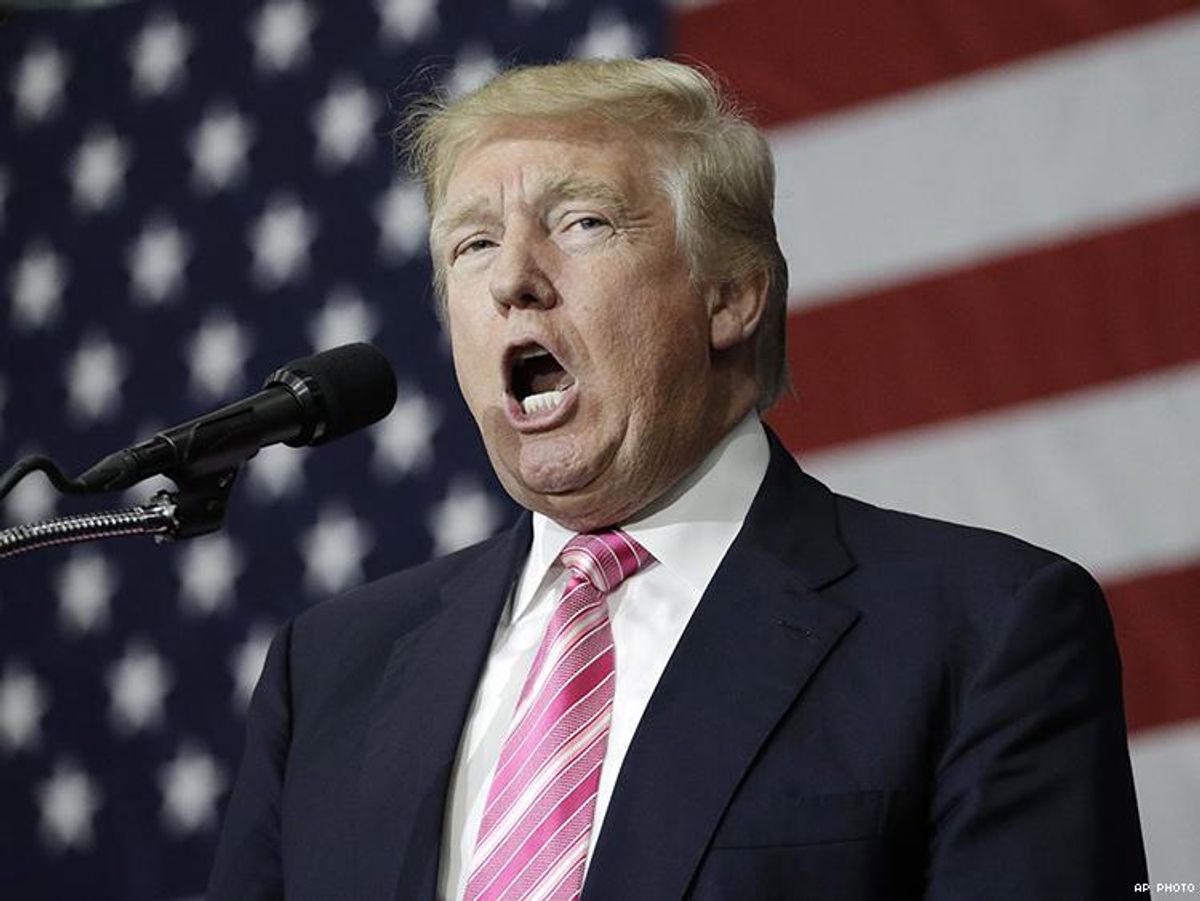
The Republican nominee asked his followers to patrol polling places.
October 03 2016 10:12 PM EST
October 04 2016 9:57 AM EST
yezyes
By continuing to use our site, you agree to our Private Policy and Terms of Use.

The Republican nominee asked his followers to patrol polling places.
During a campaign stop in Pennsylvania Saturday, Donald Trump told his followers that after they vote for him for president, they should grab their friends and go to "certain areas" to "watch" the voters.
"I hear too many bad stories, and we can't lose an election because of you know what I'm talking about," said the Republican presidential nominee, according to the Washington Post. "So, go and vote and then go check out areas because a lot of bad things happen, and we don't want to lose for that reason."
It isn't the first time Trump has told supporters to patrol for supposed voter fraud. He appears convinced there's a problem. Yet, Politicocited a national study that found only 10 cases of fraud from 2000 through 2012, which represents one in every 15 million voters. The side effects of this kind of "watching," though, are familiar from American history.
"Instead of seeing orderly poll watching," said Wendy Weiser, director of the Brennan Center for Justice's Democracy Program, in the Politico report, "we might see a lot of individuals trying to take on the role of election officials or law enforcement, and crossing the line into intimidation, discrimination and polling place disruption."
The Brennan Center for Justice authored a study on "Voter Challengers," and wrote that while voter intimidation has traditionally been masked as anxiety over "voter fraud," it has been used to supress voting groups such as African-Americans and women. The study further explained:
"Many states originally enacted challenger laws to block minority voters' access to the polls. Virginia, for instance, passed its first challenger law in the immediate wake of Reconstruction alongside a host of other suppressive measures, such as poll taxes and literacy tests, aimed at recently freed former slaves. Other states -- like Florida, Ohio, and Minnesota -- similarly passed challenger legislation during the nineteenth century to suppress turnout in black communities. Even in states where challenger laws were not enacted with an obvious discriminatory purpose, political operatives still often used challenges to discriminate against newly enfranchised groups of voters. For example, during a special election in Lisle, NY, in 1918 -- the first election after women won the right to vote in the state -- every woman who attempted to cast a ballot was challenged at the polls. This history of discriminatory voter challenges casts doubt on the fraud-prevention arguments traditionally used to justify these laws."
The Trump call for watching voters isn't limited to podiums during rallies. It's now an organized effort. Trump put up a call for volunteers on his website to serve as a "Trump Election Observer." "Help Me Stop Crooked Hillary From Rigging This Election!" reads the description on the page.
Trump spokesman Jason Miller denied that the Republican nominee called for voter intimidation. "To be clear, liberals love to throw out the voter intimidation card. What we're advocating are open, fair and honest elections," Miller said in a statement to NPR.
Miller went on to tell NPR that people watching polls is "standard for professional campaigns," and that their campaign is concerned about a "rigged system." While it's true that with every election cycle there comes a rash of stories about all the lawyers expected to be on hand to contest results, and it's also true that in most states any citizen can challenge another's qualifications to vote, it's not often that anyone other than a poll worker stands around outside voting booths.
ThinkProgressnoted after Trump's speech that poll watching gained notoriety after Reconstruction when the Ku Klux Klan adopted it as a way to keep black voters from reaching the ballot box.
Even as recent as 2012, a group called True The Vote was accused of targeting minority voters with a campaign to suppress turnout for Barack Obama's reelection. The group spent much of its time spreading disinformation ahead of Election Day while recruiting a network of citizen "poll watchers." These poll watchers would travel from the group's home base in Texas and stand guard in black neighborhoods in Wisconsin.
This election cycle, True The Vote's leader is regularly claiming that "illegal" people, namely Mexican immigrants, will flood the system and try to cast ballots for Hillary Clinton.
"It is absolutely a real thing to worry about noncitizens voting," said the group's founder, Catherine Engelbrecht, during a radio interview with Breitbart, the alt-right website. "And it's hard to look at the situation any other way except to believe that it's been done intentionally by this administration," she said on air, according to Right Wing Watch.
Watch a video of the Trump speech from this weekend below.